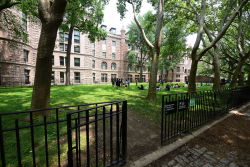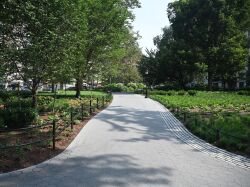Theodore Roosevelt Park
Margaret Mead Green
"Never doubt that a small group of thoughtful, committed citizens can change the world." --
Margaret Mead
In 1979, the City Council enacted a law naming the northwest portion of Theodore Roosevelt Park "Margaret Mead Green" in honor of the distinguished anthropologist. Mead (1901-1978) was born in Philadelphia, Pennsylvania, but spent most of her life in New York City. She graduated from Barnard College with a BA in psychology (1923), and then studied with Franz Boas (1858-1942) and Ruth Benedict (1887-1948) at Columbia University where she earned her doctorate in anthropology (1929).
Mead had begun her doctoral dissertation research in 1925, heading off on her own to American Samoa to study adolescent girls. She soon achieved international renown with the publication of the resultant text Coming of Age in Samoa, a success she followed four years later with another study of younger children titled Growing Up in New Guinea. Mead conducted fieldwork throughout her life in such locations as New Guinea, Samoa, Bali, the Admiralty Islands, and even North America. The American Museum of Natural History's Hall of Pacific Peoples owes many of its exhibits to Mead's research in that area.
During World War II, Mead had to postpone her studies in the South Pacific; she did not, however, abandon research altogether. Mead and her colleague Ruth Benedict founded the Institute for Intercultural Studies in 1944 as a place for scholars to analyze contemporary American culture with the same critical eye they turned on "primitive" cultures. Mead was the author of twenty-three books, not all of which were strictly scientific. She published a great number of academic essays and lectures, contributed a column to Redbook magazine and made appearances on "The Tonight Show" with Johnny Carson. Her areas of expertise were diverse, ranging from population control to women’s liberation to a space probe. Mead often spoke before the United States Congress on behalf of women, the aging, and the mentally ill.
Mead worked as a research fellow and curator of ethnology at the American Museum of Natural History from 1926 until her death in 1978. She was elected president of the American Association for the Advancement of Science and several other professional organizations. She received 28 honorary doctorates. One year after her death, Mead’s scholarship was honored with the Presidential Medal of Freedom, the highest honor the United States grants to a civilian. The Museum commemorates Mead with an annual festival of anthropology films and videos in the spring. Mead's only daughter, Mary Catherine Bateson (1939-), is an anthropologist and English professor who has written and co-authored eight books and serves as the current president of the Institute for Intercultural Studies.
This park area is a lasting tribute to a woman whose legacy of groundbreaking scholarship and progressive social consciousness endures beyond her years. This park is appropriately situated between the Museum tower that once held Mead's office and the apartment building on 81st Street where she lived for many years.
The Friends of Museum Park, a neighborhood organization, has helped to maintain Margaret Mead Green in the past. In 2000, the Margaret Mead Green was renovated along with the rest of Theodore Roosevelt Park. In addition to a new irrigation system, the paths and lawns were restored, and new benches were added. Beds of native wildflowers and new groundcover enhance the natural beauty of the Green. With the help of Parks & Recreation, the Central Park Conservancy, the American Museum of Natural History, and the Friends of Museum Park, Margaret Mead Green’s future will be greener than ever.
Check out your park's Vital Signs
Clean & Safe
Green & Resilient
Empowered & Engaged Users
Share your feedback or learn more about how this park is part of a
Vital Park System












